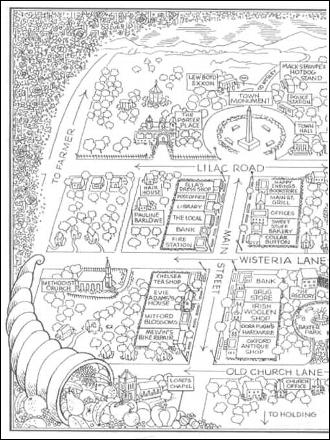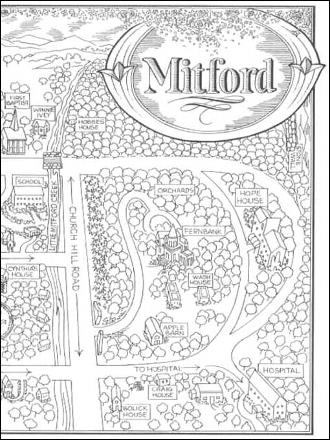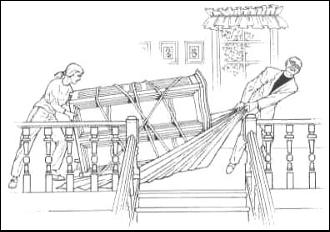Out to Canaan (124 page)
Authors: Jan Karon

They circled around to the front steps and honked, as Andrew and Anna came to the door and opened it and waved, calling out felicitations of their own. “Don't mention this to Rodney Underwood!” he said to the couple on the porch.
Andrew laughed. “Our lips are sealed!
Joyeux noël!
”
“
Ciao!
” cried Anna. “Come soon again!”
They eased down the Fernbank drive and saw the town lying at the foot of the steep hill like a make-believe village under a tree. There was the huge fir at Town Hall with its ropes of colored lights, and the glittering ribbon of Main Street, and the shining houses.
An English writer, coincidentally named Mitford, had said it so well, he could recite it like a schoolboy.
She had called her village “a world of our own, close-packed and insulated like . . . bees in a hive or sheep in a fold or nuns in a convent or sailors in a ship, where we know everyone, and are authorized to hope that everyone feels an interest in us.”
Go tell it on the mountain, over the hills and everywhere
 . . .
After a stop by Tommy's and then by Hattie Cloer's, they headed home.
“Harley, want to have a cup of tea with us before tonight's service?”
“No, sir, Rev'rend, I'm tryin' t' fool with a batch of fudge brownies to bring upstairs tomorrow.”
Temptation on every side, and no hope for it.
“Say, Dad, want to watch a video before church? Tommy loaned me his VCR. It's a baseball movie, you'll like it.”
If there were a tax on joy on this night of nights, he'd be dead broke.
“Consider it done!” he said.
He sat clutching the pint of cream in a bag, feeling they'd gone forth and captured some valuable trophy or prize, as they rode slowly between the ranks of angels on high and turned onto their trackless street.
Â
Jan Karon, who lives in Blowing Rock, North Carolina, was an award-winning advertising executive before following her dream of writing books. She is the author of three previous Mitford novels,
At Home in Mitford, A Light in the Window
, and
These High, Green Hills
, all available from Penguin.
At Home in Mitford
was named an ABBY Honor Book by the American Booksellers Association.

For all families
who struggle to forgive
and be forgiven

“
I will restore unto you
the days the locusts
have eaten
 . . .”
Joel 2:25
My warmest thanks to:
Candace Freeland; Barry Setzer; Joe Edmisten; Carolyn McNeely; Dr. Margaret Federhart; Fr. Scott Oxford; Jerry Walsh; Blowing Rock BP; Crystal Coffey; Mary Lentz; Jane Hodges; Jim Atkinson; Derald West; Loonis McGlohan; Laura Watts; David Watts; Rev. Gale Cooper and my friends at St. John's; Rev. Jim Trollinger and my friends at Jamestown United Methodist; Fr. Russell Johnson and my friends at St. Paul's; Roald and Marjorie Carlson; W. David Holden; Alex Gabbard; Kay O'Neill; Dr. Richard Chestnutt; Everett Barrineau and all my friends on the Viking Penguin sales force; Aunt Wilma Argo; The Fellowship of Christ, The Saviour; Charles Davant, III; Posie Dauphine; Chuck Meltsner; Kenny Johnson; Fr. Richard Bass; Rev. Richard Holshouser; Christine Hillis; Danilo Ragogna; Dr. Rosemary Horowitz; Helen Horowitz; Susan Weinberg; Sarah Cole; and Tim Knight.
Special thanks to Judy Burns; Jerry Torchia; Dan Blair, a national umpire staff member of the Amateur Softball Association; Flyin' George Ronan of Free Spirit Aviation; Dr. Bunky Davant, Mitford's attending physician; Tony diSanti, Mitford's legal counsel; Alex Hallmark, Mitford's tireless realtor; and all the wonderful readers and booksellers who are helping put the little town with the big heart on the map.




A Tea and a Half
The indoor plants were among the first to venture outside and breathe the fresh, cold air of Mitford's early spring.
Eager for a dapple of sunlight, starved for the revival of mountain breezes, dozens of begonias and ferns, Easter lilies and Wandering Jews were set out, pot-bound and listless, on porches throughout the village.
As the temperature soared into the low fifties, Winnie Ivey thumped three begonias, a sullen gloxinia, and a Boston fern onto the back steps of the house on Lilac Road, where she was now living. Remembering the shamrock, which was covered with aphids, she fetched it from the kitchen and set it on the railing.
“There!” she said, collecting a lungful of the sharp, pure air. “That ought to fix th' lot of you.”
When she opened the back door the following morning, she was stricken at the sight. The carefully wintered plants had been turned to mush by a stark raving freeze and minor snow that also wrenched any notion of early bloom from the lilac bushes.
It was that blasted puzzle she'd worked until one o'clock in the morning, which caused her to forget last night's weather news. There she'd sat like a moron, her feet turning to ice as the temperature plummeted, trying to figure out five letters across for a grove of trees.
Racked with guilt, she consoled herself with the fact that it had, at least, been a chemical-free way to get rid of aphids.
At the hardware, Dora Pugh shook her head and sighed. Betrayed by yesterday's dazzling sunshine, she had done display windows with live baby chicks, wire garden fencing, seeds, and watering cans. Now she might as well haul the snow shovels back and do a final clearance on salt for driveways.
Coot Hendrick collected his bet of five dollars and an RC Cola from Lew Boyd. “Ain't th' first time and won't be th' last you'll see snow in May,” he said, grinning. Lew Boyd hated it when Coot grinned, showing his stubs for teeth. He mostly hated it that, concerning weather in Mitford, the skeptics, cynics, and pessimists were usually right.
“Rats!” said Cynthia Kavanagh, who had left a wet scatter rug hanging over the rectory porch rail. Lifting it off the rail, she found it frozen as a popsicle and able to stand perfectly upright.
Father Timothy Kavanagh, rector at the Chapel of our Lord and Savior, had never heard such moaning and groaning about spring's tedious delay, and encountered it even in Happy Endings Bookstore, where, on yet another cold, overcast morning, he picked up a volume entitled
Hummingbirds in the Garden.
“Hummingbirds?” wailed young Hope Winchester, ringing the sale. “
What
hummingbirds? I suppose you think a hummingbird would dare stick its beak into this arctic tundra, this endless twilight, this . . . this
villatic barbican?
”
“Villatic barbican” was a phrase she had learned only yesterday from a book, and wanted to use it before she forgot it. She knew the rector from Lord's Chapel was somebody she could use such words withâhe hadn't flinched when she said “empirical” only last week, and seemed to know exactly what she was talking about.
While everyone else offered lamentations exceeding those of the prophet Jeremiah, the rector felt smugly indifferent to complaints that spring would never come. He had to admit, however, that last
Sunday was one of the few times he'd conducted an Easter service in long johns and ski socks.
Turning up his collar, he leaned into a driving wind and headed toward the office.
Hadn't winter dumped ice, snow, sleet, hail, and rainstorms on the village since late October? Hadn't they been blanketed by fog so thick you could cut it with a dull knife, time and time again?
With all that moisture seeping into the ground for so many long months, didn't this foretell the most glorious springtime in years? And wasn't that, after all, worth the endless assault?
“Absolutely!” he proclaimed aloud, trucking past the Irish Woolen Shop. “No doubt about it!”
“See there?” said Hessie Mayhew, peering out the store window. “It's got Father Tim talking to himself, it's that bad.” She sighed. “They say if sunlight doesn't get to your pineal glands for months on end, your sex drive quits.”
Minnie Lomax, who was writing sale tags for boiled wool sweaters, looked up and blinked. “What do you know about pineal glands?” She was afraid to ask what Hessie might know about sex drive.
“What does anybody know about pineal glands?” asked Hessie, looking gloomy.
Uncle Billy Watson opened his back door and, without leaving the threshold, lifted the hanging basket off the nail and hauled it inside.
“Look what you've gone and done to that geranium!” snapped his wife of nearly fifty years. “I've petted that thing the winter long, and now it's dead as a doornail.”
The old man looked guilt-stricken. “B'fore I hung it out there, hit was already gone south!”
“Shut my mouth? Did you say shut my mouth?” Miss Rose, who refused to wear hearing aids, glared at him.
“I said
gone south
! Dead! Yeller leaves!”
He went to the kitchen radiator and thumped the hanging basket on top. “There!” he said, disgusted with trying to have a garden in a climate like this. “That'll fire it up again.”
The rector noted the spears of hosta that had congregated in beds
outside the church office. Now, there, as far as spring was concerned, was something you could count on. Hosta was as sturdy a plant as you could put in the ground. Like the postman, neither sleet nor snow could drive it back. Once out of the ground, up it came, fiercely defiantâonly, of course, to have its broad leaves shredded like so much Swiss cheese by Mitford's summer hail.
“It's a jungle out there,” he sighed, unlocking his office door.

After the snow flurry and freeze came a day of rain followed by a sudden storm of sleet that pecked against the windows like a flock of house sparrows.
His wife, he noted, looked pale. She was sitting at the study window, staring at the infernal weather and chewing her bottom lip. She was also biting the cuticle of her thumb, wrapping a strand of hair around one finger, tapping her foot, and generally amusing herself. He, meanwhile, was reading yet another new book and doing something productive.
A low fire crackled on the hearth.
“Amazing!” he said. “You'd never guess one of the things that attracts butterflies.”
“I don't have a clue,” said Cynthia, appearing not to want one, either. The sleet gusted against the windowpanes.
“Birdbaths!” he exclaimed. No response. “Ditto with honeysuckle!”
He tried again. “Thinking about the Primrose Tea, are you?”
The second edition of his wife's famous parish-wide tea was coming in less than two weeks. Last year at this time, she was living on a stepladder, frantically repainting the kitchen and dining room, removing his octogenarian drapes, and knocking holes in the plaster to affect an “old Italian villa” look. Now here she was, staring out the window without any visible concern for the countless lemon squares, miniature quiches, vegetable sandwiches, and other items she'd need to feed a hundred and twenty-five women, nearly all of whom would look upon the tea as lunch.
His dog, Barnabas, ambled in and crashed by the hearth, as if drugged.
Cynthia tapped her foot and drummed her fingers on the chair arm. “Hmmm,” she said.
“Hmmm what?”
She looked at him. “T.D.A.”
“T.D.A. ?”
“The Dreaded Armoire, dearest.”
His heart pounded. Please, no. Not the armoire. “What about it?” he asked, fearing the answer.
“It's time to move it into our bedroom from the guest room. Remember? We said we were going to do it in the spring!” She smiled at him suddenly, as she was wont to do, and her sapphire-colored eyes gleamed. After a year and a half of marriage, how was it that a certain look from her still made him weak in the knees?
“Aha.”
“So!” she said, lifting her hands and looking earnest.
“So? So, it's not spring!” He got up from the sofa and pointed toward the window. “See that? You call that spring? This, Kavanagh, is as far from spring as . . . as . . .”
“As Trieste is from Wesley,” she said, helping out, “or the Red Sea from Mitford Creek.” He could never get over the way her mind worked. “But do not look at the weather, Timothy, look at the calendar! May third!”
Last fall, they had hauled the enormous armoire down her stairs, down her back steps, through the hedge, up his back steps, along the hall, and finally up the staircase to the guest room, where he had wanted nothing more than to fall prostrate on the rug.
Had she liked it in the guest room, after all that? No, indeed. She had despised the very sight of it sitting there, and instantly came up with a further plan, to be executed in the springâall of which meant more unloading of drawers and shelves, more lashing the doors closed with a rope, and more haulingâthis time across the landing to their bedroom, where, he was convinced, it would tower over them in the night like a five-story parking garage.
“What are you going to do about the tea?” he asked, hoping to distract her.
“Not much at all 'til we get the armoire moved. You know how they are, Timothy, they want to poke into every nook and cranny.
Last year, Hessie Mayhew was down on her very hands and knees, peering into the laundry chute, I saw her with my own eyes. And Georgia Moore opened every cabinet door in the kitchen, she said she was looking for a water glass, when I know for a fact she was seeing if the dishes were stacked to her liking. So, I certainly can't have the armoire standing on that wall in the guest room where it is clearly . . .” she paused and looked at him, “
clearly
out of place.”
He was in for it.

He had managed to hold off the move for a full week, but in return for the delay was required to make four pans of brownies (a specialty since seminary), clean out the fireplace, black the andirons, and prune the overgrown forsythia at the dining room windows.
Not bad, considering.
On Saturday morning before the big event the following Friday, he rose early, prayed, studied Paul's first letter to the Corinthians, and sat with his sermon notes; then he ran two miles with Barnabas on his red leash, and returned home fit for anything.